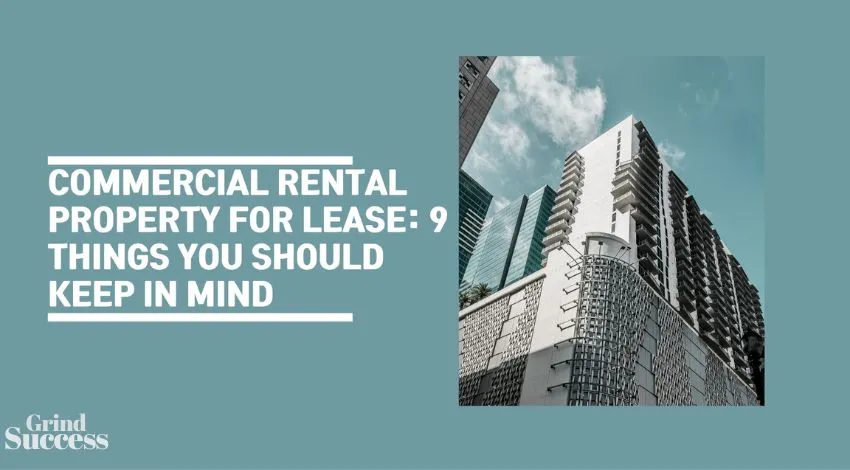Commercial Rental Property For Lease: 9 Things You Should Keep In Mind

A commercial lease is a very important factor for every business. Leasing a commercial space differs from leasing a residential space. That’s because commercial spaces have their own challenges whether you’re leasing for retail, office, or industrial buildings.
Note that the challenges are supposed to be addressed beforehand to ensure the smooth run and growth of your business. It helps to ensure that there aren’t any unreasonable restrictions or interruptions from the property owner.
A well-negotiated commercial lease ensures that the tenant doesn’t run into any problems. In short, investments in the real estate sector are tricky. As such, they must be carried out with proper research to avoid a foul game.
9 Things To Keep In Mind About Commercial Rental Properties
Commercial leases can be intimidating. There are times when you’ll be dealing with a landlord-favored market and other times the market will be in favor of the tenant.
And while the landlord is always looking for opportunities to get a higher profit, the tenant is always looking for ways to reduce costs. Basically, everyone is always trying to get what’s best for them into the lease.
Below, we tell you what you must keep in mind when looking for your next commercial rental property.

1. Understanding The Full Financial Commitment
Before looking at a commercial rental property, you must understand what the lease entails financially. You must be aware of your business’s financial health.
This includes the cash flow, the projected annual revenue, and the ability to assume risk. That will help to know what you can afford when looking for a retail space for lease.
Some people prefer getting a commercial real estate loan to secure a small commercial space for rent.
But it’s important that you first weigh the pros and cons of going into debt if you’re to grow your business. Be clear about the possible return on investment before acquiring a commercial space.
Note that leases are a long-term commitment and as such, it’s important that you know how you will pay for the commercial lease.
2. Understand Real Estate Terminologies
Financial preparedness isn’t the only aspect that will help you decide whether to acquire a small commercial space for rent.
Not even if you think that you already found a perfect location that you can afford. You must first be able to read the fine print before making a commitment.
You must, for instance, understand the difference between the various classes of commercial property, which are A, B, and C. You must also know the difference between a “rentable” and “usable” space.
A usable space is strictly the one you occupy and use for your business. Also, you can be charged a lot more for the shared cost of the full rentable space for the building.
You will find more additional terms incorporated into the lease agreement with some being insurance and real estate taxes. There are also the maintenance and operating costs of the building and utilities.
This can lead to the addition of more costs to the transaction that you must also know about.
Moreover, the lease must include provisions for:
3. Take Your Time
Keep in mind that the process of finding the best location for your retail space for lease will be time-consuming and stressful. Knowing and accepting this fact will make everything bearable.
Note that getting the best place for your business can be a make-or-break proposition. So you must ensure that you give yourself enough time to do it correctly. Resist the need to settle for something that will hinder the growth of your business.
Additionally, you must stop to think whenever you find yourself ready to sign a lease agreement.
Taking an extra day to think it over, for instance, will serve to ensure that you’re absolutely sure of what you’re getting into. This is something a good and experienced landlord should understand.
4. Engage A Commercial Real Estate Broker and An Attorney
Being an entrepreneur means understanding your strengths and weaknesses. It also means knowing when to delegate responsibilities elsewhere.
Finding and negotiating a lease is something that you should leave in the hands of a trusted broker. Remember that brokers spend a lot of time leasing and navigating the real estate market.
Thus, you must let them handle this unless, of course, you’re also experienced in real estate matters. A trusted and good broker helps their client by landing them more favorable properties with better terms.
Moreover, signing the wrong commercial lease from the wrong landlord can be an expensive mistake. It can cause negative repercussions for your business that go far beyond the question of real estate.
Remember that like other legally binding contracts, you can never sign a property lease until the document has been vetted and approved by a legal expert.
Unlike potential landlords, your attorney works for you. They’re also paid to make sure that they take care of your interests in protecting the company.
5. Think Long-Term
It could be that you don’t intend on staying in that shop space for rent forever. Thus, it’s crucial that you think about the long-term effect that the retail building will have on your company’s image.
You must also remember that you’re investing in your company’s brand. So you must carefully think about where you want to establish your footprint and the type of image a certain neighborhood or facility conveys.
Consult your legal and real estate advisor to help you design a strategy that works for the future of your business.
6. Learn About The Nuisance Loans
Being able to operate your business to its full capacity is a very key aspect of signing a lease. A lot of leases have extensive points on noise, for instance, smells, and other things.
You may be opening up a restaurant only to realize that one of the building rules says “no offensive odor.” In such a case, you will need to negotiate an offensive odor’s stipulation.”
And in any case, whether a smell is offensive or not is subjective. Thus, you’ll need to ensure that you get an exception for smells ordinary to restaurants.
You also have to research the basic environmental laws about the property before signing anything. That’s because landlords often miss these laws, yet they can be used against your business. So do your due diligence on the property.
Research the local area, zoning laws, and any other nuance and environmental laws that the property is subject to.
7. Find Out About The Maintenance Fees
Some areas charge common maintenance fees and this applies to every tenant with a rental property. Thus, it’s crucial that you know about all the hidden costs.
Make sure that the lease agreement shows the common area where the maintenance fee is computed. It must also indicate who’s going to pay the costs once incurred.
Let’s assume that you sublease the property. This would mean that the common maintenance fee gets subdivided.
That’s considering that landlords tend to add extra common area maintenance costs whenever a property has vacancies. We recommend that you negotiate this out of your lease since it only favors the landlord.
But if your potential landlord becomes unreasonable, feel free to walk away. Don’t ever believe that the landlord is entitled to additional benefits if, in fact, those benefits jeopardize your business.
8. Get Additional Provisions Into The Commercial Lease
An agreement is supposed to get completed in its entirety. So there should be nothing left for later negotiations. You must ensure that all situations are covered in the lease. That’s because much of the success in your business depends on the lease.
You must also include future provisions such as insurance requirements, operational, and a sublet clause. Beware of demolition clauses as well since such provisions in commercial leases require tenants to pay for significant renovations.
This can be the expenses of the roof, for instance, or the parking lot. These are examples of the provisions that you must avoid at all costs.
9. Find Out More About The Landlord and The Owner Of The Building
This is an important aspect of research that’s often overlooked. It’s crucial that you learn more about the landlord and the owner of the building because sometimes your direct landlord may not be the owner of the building.
Either way, find out as much as you can about these two individuals. Remember that you’re getting into a business partnership. Thus, you must have a good idea of who they are, what their financial situation is, and whether they are making good on their payments.
Note that in some states, tenants get evicted in the event of foreclosure if a landlord fails to make payments to the owner of the building.
This is the same case if they fail to make mortgage payments to the bank, and it won’t matter that your business has been on time with every payment.
This is just an example of how important it is that you know more about your future landlord and the owner of the building. Conducting a search on public records will help you to find the information that you seek.
You can also ask for documents that are related to the landlord’s limited liability company or business entry. That will help you in knowing whether it’s an ideal partner for your business.
Conclusion
Leasing a commercial property is an important decision to make. That’s considering that it can have a serious impact on the overall health of your business, especially, in the long term.
Leasing also comes with a lot of financial responsibilities, especially for startups. Any retail space for lease can add or make a dent in the image of your business, which is why you need to keep these aspects in mind.
